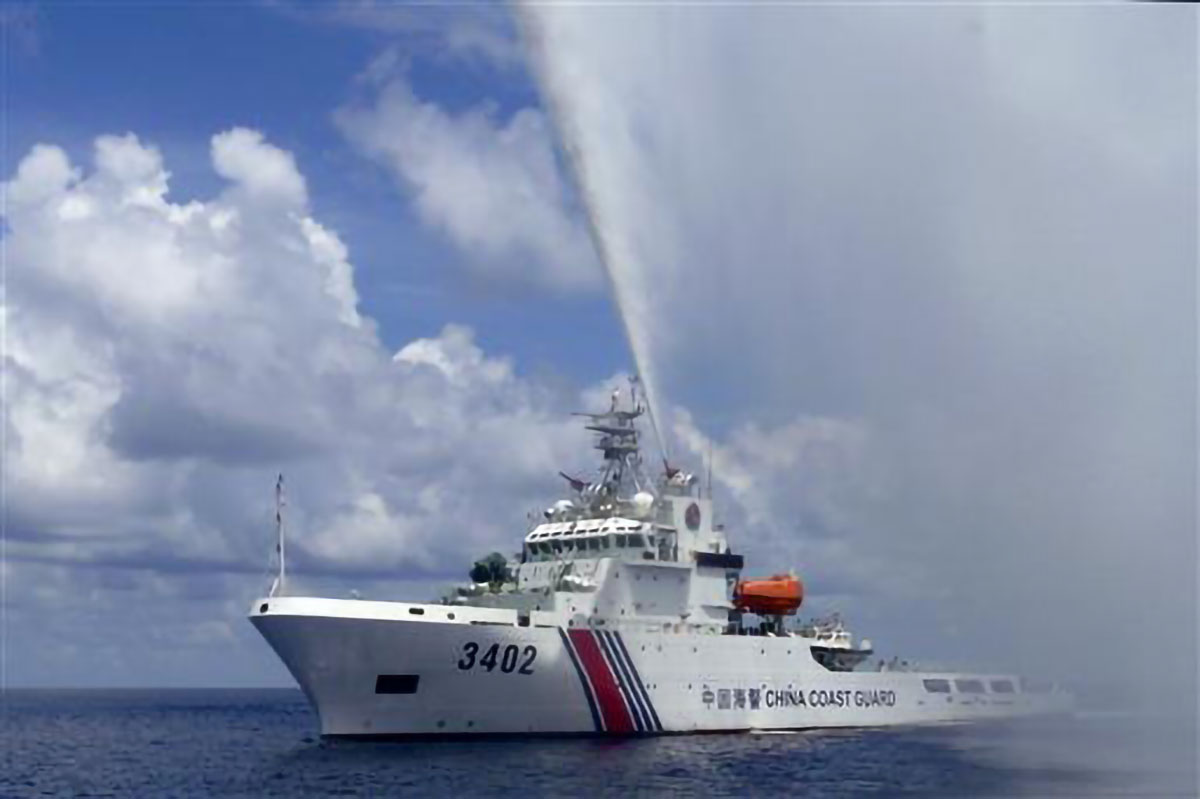
In this September 23, 2015, photo, provided by Filipino fisherman Renato Etac, a Chinese Coast Guard boat sprays a water cannon at Filipino fishermen near Scarborough Shoal in the South China Sea. (Renato Etac via AP)
MANILA, Philippines — House Speaker Ferdinand Martin Romualdez on Saturday condemned China’s order to arrest foreign nationals in the West Philippine Sea, describing the pronouncement as a “blatant escalation of tensions” in the disputed waters.
China has approved new regulations authorizing its coast guard to detain foreign “trespassers” for up to 60 days without trial if they cross what Beijing claims are its borders.
Romualdez said that China’s actions “flagrantly violate international law and the established norms” governing the South China Sea, where multiple nations, including the Philippines, have overlapping territorial claims.
MORE ON: West Philippine Sea
“China’s aggressive pronouncements are a blatant escalation of tensions in the West Philippine Sea. These unilateral actions flagrantly violate international law and the established norms that guide the Philippines and other law-abiding nations with claims in the South China Sea,” Romualdez said.
The “Provisions on Administrative Law Enforcement Procedures of Coast Guard Agencies,” a 92-page document obtained by reporters, states that foreigners suspected of illegally entering or exiting Chinese territory, or assisting others in such activities, may be detained.
Those suspected of endangering national security, disrupting public order, or engaging in other illegal activities may be detained for up to 30 days, extendable to 60 days for complicated cases with higher-level approval.
The new regulations, deliberated and adopted on May 15, will take effect on June 15.
Romualdez said that the Philippines will not stand idly by while its sovereignty is threatened.
READ: Respect civilian mission to Panatag, China told
“The House of the Filipino People will not tolerate any arrests of our citizens or fishermen within our own Exclusive Economic Zone (EEZ). We will fiercely defend our sovereignty and ensure the safety and rights of our people,” he said.
The country’s EEZ includes Scarborough (Panatag) Shoal off Zambales and Pangasinan, which China seized in 2012, and Ayungin Shoal, near Palawan, where an old navy vessel is grounded and a platoon of Filipino soldiers is stationed as a symbol of Philippine sovereignty.
Romualdez emphasized the importance of adhering to international rulings and norms, particularly the 2016 decision of the Permanent Court of Arbitration in The Hague, which invalidated China’s sweeping claims in the South China Sea. Despite this ruling, China has continued to assert its dominance in the region, often to the detriment of other claimants.
“China must respect international rulings and act as a responsible member of the global community, rather than imposing its own laws unilaterally and bullying other nations,” Romualdez said.
China’s pronouncements came after the Atin Ito Coalition’s on May 16 concluded civilian-led supply mission in the West Philippine Sea, achieving its main objectives, particularly in the Philippines’ exclusive economic zone near Masinloc town in Zambales province and the general vicinity of Scarborough (Panatag) Shoal.
On the same day, Atin Ito reported that its 10-member advance team had arrived 25 to 30 nautical miles from the general vicinity of Bajo de Masinloc and breached China’s “illegal blockade.”
During the first night of the voyage on May 15, two China Coast Guard vessels shadowed and attempted to block the Filipino civilian-led convoy sailing toward Scarborough Shoal.
The West Philippine Sea, part of the larger South China Sea, has been a flashpoint for territorial disputes involving China, the Philippines, Vietnam, Malaysia, Brunei, and Taiwan. The area is rich in resources and holds strategic military significance, making it a contentious zone for geopolitical tensions.

